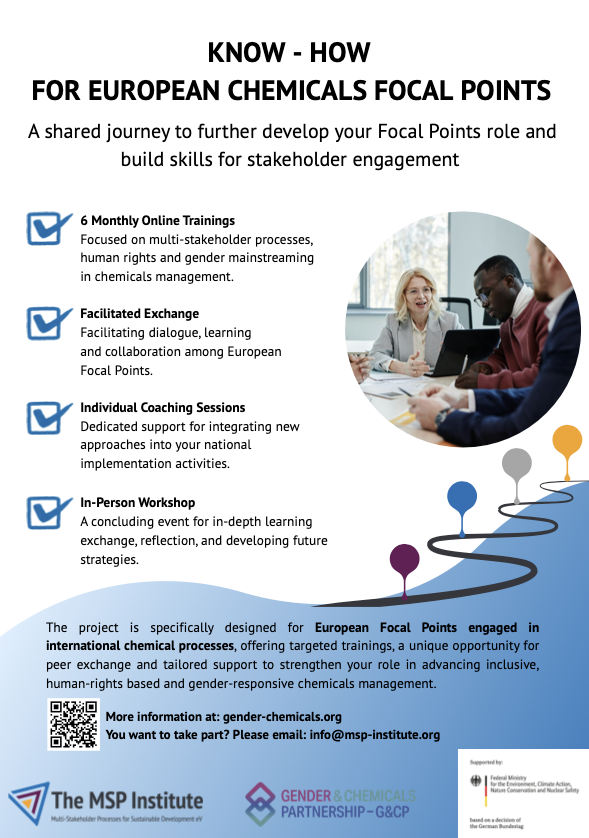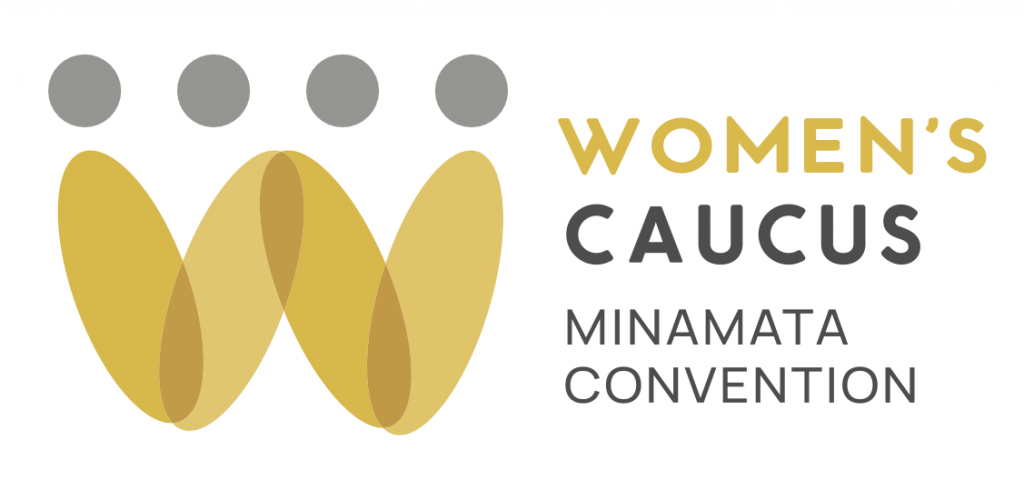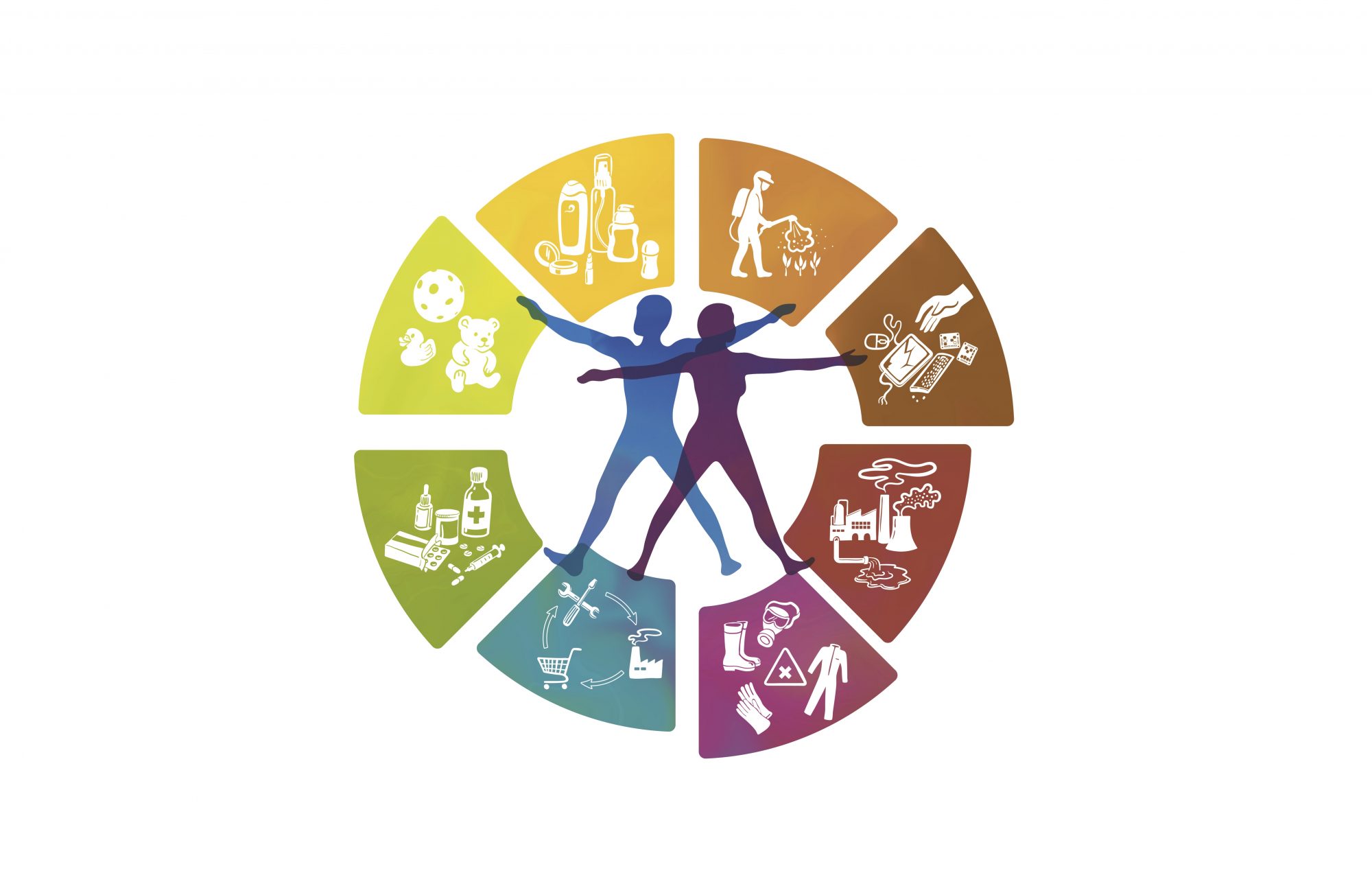MSP Institute issues an occasional newsletter about gender and chemicals. It contains updates from our project work, as well as information from the broader gender and chemicals community and international chemicals and waste management policy processes, especially SAICM.
Sign up for our newsletter “Gender and Chemicals”.
We use the newsletter program Newsletter2Go. If you have any questions regarding our data policy, see our data protection policy or write to us. You can unsubscribe from this newsletter at any time by using the link in the newsletter email.
You can also contact us if you would like to contribute a piece for the next newsletter edition.
Summer Newsletter 2025:
As we move into the second half of 2025, the MSP Institute is pleased to share recent milestones and updates. From ongoing projects to new publications, and from global negotiations to expanding community collaboration, we’re proud to continue advancing gender-responsive chemicals management—together with our partners and allies.

G&CP Updates: Growing Membership & Working Groups in Action
Catch up on updates and how to get involved at the G&CP Website.
Membership:
The Gender & Chemicals Partnership (G&CP) continues to grow, now comprising 21 members. We warmly welcome new members from across regions and sectors: the Shree Chanakya Education Society’s Indira Group of Institutes, the United Nations Environment Programme, Women4Biodiversity and several individual experts. You can find a list of all partners here.
Working Groups:
Our four Working Groups – Data & Information, Education & Training, National & Regional Level Implementation, and International Policy Processes – continue to meet regularly and are developing key outputs aligned with the Partnership’s strategic objectives.
New Blog Article “Harmonized Standards in Textiles & Disability Inclusion”
G&CP members Nancy Marangu (Chemichemi Foundation) and Mariella Noto (ZDHC Foundation), together with Catherine Kuria of the Chemichemi Foundation, co-authored a compelling article exploring chemical waste prevention in the fashion and textile industry, with a focus on women with disabilities in Africa. This blog highlights the intersection of gender, disability, and environmental justice within global supply chains. Read the full article here!
Side Event at BRS COP 2025
On May 2, 2025, the side event “Gender and Chemicals: Making Gender Equality Visible through the Gender and Chemicals Alliance” was held in the framework of the Conferences of the Parties to the Basel, Rotterdam and Stockholm Conventions (BRS COPs). Organized by G&CP Board Member the Permanent Mission of Mexico, this event showcased the Partnership’s growing momentum and reinforced the shared commitment to gender mainstreaming in chemicals management.
Updates on the Gender Action Plan for the Global Framework on Chemicals
This June, at the First Open-Ended Working Group (OEWG1) of the Global Framework on Chemicals (GFC) in Punta del Este, Uruguay, the MSP Institute proudly presented the draft Gender Action Plan (GFC-GAP). Developed under the leadership of Maru González Anaya, and supported through a UNEP small-scale grant, the GAP is a product of close collaboration with the GFC Secretariat and key stakeholders.
The draft was met with broad support and constructive feedback from a wide range of stakeholders, including: the Children and Youth Major Group, the European Union, IPEN, Costa Rica, Uruguay, Colombia, The Gambia, the Africa Group, the German Forum on Environment and Development, the Office of the High Commissioner for Human Rights (OHCHR), Canada, and Mexico.
You can read the full draft report here, and our blog article report on the meeting in Uruguay here.
Webinar recording: Advancing the GAP through Dialogue
In collaboration with the Green Forum and the Green Growth Knowledge Partnership (GGKP), The Secretariat to the Global Framework on Chemicals (GFC) hosted, with support from the MSP Institute, a stakeholder webinar introducing the draft Gender Action Plan (GAP) under the GFC. The session was an opportunity to review the proposed GAP, share good practices, and gather feedback to strengthen gender mainstreaming in global chemicals and waste governance.
Watch the webinar recording here.

New Project: Know-How for European Chemicals Focal Points
In February, the MSP Institute launched the project “Know-How for European Chemicals Focal Points,” funded by the European Environmental Initiative (EURENI) of the German Federal Ministry for the Environment, Climate Action, Nature Conservation and Nuclear Safety (BMUKN).
The project aims to strengthen the capacities of European Focal Points to the Global Framework on Chemicals (GFC) and the Science-Policy Panel on Chemicals, Waste, and Pollution. Through informal knowledge-sharing sessions, participants will gain practical insights into operationalizing mechanisms that support GFC implementation.
Through a mix of online trainings, continuous peer learning, and a final in-person workshop, the project will foster meaningful stakeholder participation, promote cooperation, and address gender-specific risks in chemicals management. While the initial focus is on European Focal Points, the tools, materials, and methods developed are designed to be adaptable and applicable across other regions as well.
Learn more about the new project here.
Registration for the virtual training series is possible here.

New: Women’s Caucus of the Minamata Convention
In collaboration with Women4Biodiversity, and with the support of the Minamata Secretariat, the MSP Institute co-convened the launch of the new Women’s Caucus of the Minamata Convention.
The Women’s Caucus serves as a space to advance gender equality and the empowerment of women within the implementation of the Minamata Convention on Mercury. It provides a self-organized framework for collective action, shaped by shared experiences and perspectives on preventing women’s exposure to mercury and driving positive change for women in mercury-related decision-making processes.
Membership is open to all interested individuals, representatives of communities and civil society organizations (CSOs) working in the field of women and mercury. Membership is free of cost and does not entitle financial support for projects, activities nor attendance to meetings of the Minamata Convention.
Learn more about the Women’s Caucus and register here.
Further Activities and Projects We Aim to Implement
- Conducting gender-focused trainings in chemicals management
- Developing National Gender Action Plans for Chemicals Policy
- Organizing the first International Conference on Gender and Chemicals
- Enhancing women’s participation and gender expertise in international policy processes, including through the provision of travel support
👉 We are currently seeking funding opportunities to make these initiatives a reality. If you are interested in supporting our efforts, or can suggest potential funding sources, we would be delighted to hear from you.
Thank you for your continued support and interest in our work for a gender-just chemicals future. Stay tuned as we continue developing tools, activities, and policy interventions for a healthier and more equitable planet.
Warm regards from the MSP Institute team!
